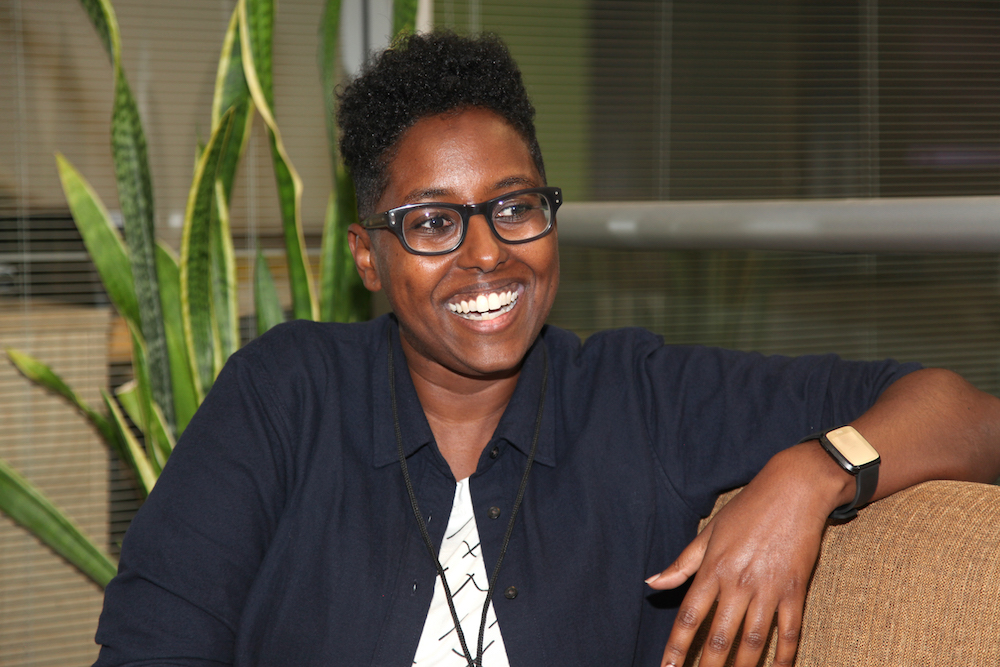
Photo by Aaron Salcido.
Rahawa Haile is a hiker and writer whose work has appeared in The New York Times Magazine, The Atlantic and The New Yorker. Before moderating a Zócalo/Natural History Museum of Los Angeles County panel discussion titled “Is Nature Only for White People?” at the Natural History Museum of Los Angeles County, she spoke in the green room about snorkeling in the Florida Keys, hiking the Appalachian Trail, and the psychological and emotional challenges of writing about climate change.
Is there a landscape that you revisit periodically just to kind of check in with yourself?
Yes. I grew up in Miami Beach, so South Florida is it for me. The beach is what feels like home. And it isn’t just the sand, but also the wind, and the smell of the salt in the air is a really big force in my life. I feel like I spent my entire childhood surrounded by sun and these massive cumulus clouds, and this kind, warm wind. And it had a profound effect on me. And that’s what I think of when I think of my happy space in nature. But I also love the forests! I did a thru-hike of the High Sierra Trail; it’s alpine hiking and very hard, right? It’s all this hard granite, which is amazing, but not on your feet! I do miss forest floors. There’s something about the simultaneous quiet of a forest, and the chatter of life, of birds and squirrels and all the other things that go into the natural world.
Were you always connected with nature as a child?
Yes. I feel like I spent my entire childhood either in the swamps of the Everglades or snorkeling in the Keys. I think South Florida helps build this tough exterior for the elements, because you endure a lot: There are mosquitos, the sun is very hot, you’re constantly sweating, it’s so humid. And I think it helps one build up a tolerance for discomfort that I’ve found essential on every other backpacking trip that I’ve gone on!
Where’s your next trip?
I haven’t decided. I think my next trip is finishing this book that I’m writing, and I have until June. It’s about my thru-hike of the Appalachian Trail in 2016, and about the events that followed. I finished the hike three weeks before the [presidential] election.
And emerged out into that world.
Exactly. Post-trail depression is hard enough. And it wasn’t just dealing with the political climate, but the effect that the current administration had on the EPA, on how the outdoors are conserved or not conserved. And it’s been difficult for people who love the outdoors to see what’s happened to Bears Ears [National Monument in Utah]. I think people are frightened, and rightly so, but I also think they’re galvanized. And I think many people truly see what’s at risk if things continue apace with regards to the environment.
What else do you do to unwind?
I play guitar, just for myself. But honestly, I spend time with friends. They’re the ones who keep me grounded. And it’s hard, because when someone is writing about the things that I write about—about climate change, about mass migration, about the outdoors—to find a way to decompress, and to not lose your mind. Because it’s very easy to just spiral every day. And so my friends and my guitar, and my cat, keep me grounded.
Do you like to hike alone mostly?
Yes. I love to hike alone. And I’m very grateful that I live in the Bay Area, so there are ample opportunities to just drive into the hills and kind of go up. I do miss the longer hikes; I haven’t done as many backpacking trips along the Bay. But it’s very easy to go for a day hike. And especially as a freelancer, I get to do that in the middle of the week when it’s a little less crowded.
If you could time-travel anywhere, where would you go?
On Earth?
Anywhere.
Well, I will stay on Earth, because I love Earth so much. I would like to go forward 100 years, because I’m betting on us, I’m betting on humanity. I’m hoping against hope that we manage to deal with the coming century and the many climate refugees with significantly more compassion than we’ve shown. And I hope I get to see at least some of that before I die.
What’s the most important book to you about nature?
One of the big texts that I cite in my book is Black Faces, White Spaces, by Carolyn Finney, who’s a professor. She’s tremendous. She talks about the outdoors and why it seems like it’s predominantly white, the history that went into creating spaces, and also the history of how we’ve talked about people of color and dehumanized them. It’s just a really well-written book that I think lays out the history in a very clear and linear way, to help people understand that we didn’t just arrive here overnight. Women, people of color, queer hikers—pretty much anyone who isn’t a cis, able-bodied white man might hesitate before going on a solo backpacking trip.
When you go hiking alone, do you ever fear?
I always fear—perhaps not this second. I’m a queer black woman. This country was not built to make me feel safe. And so I rarely feel safe.



